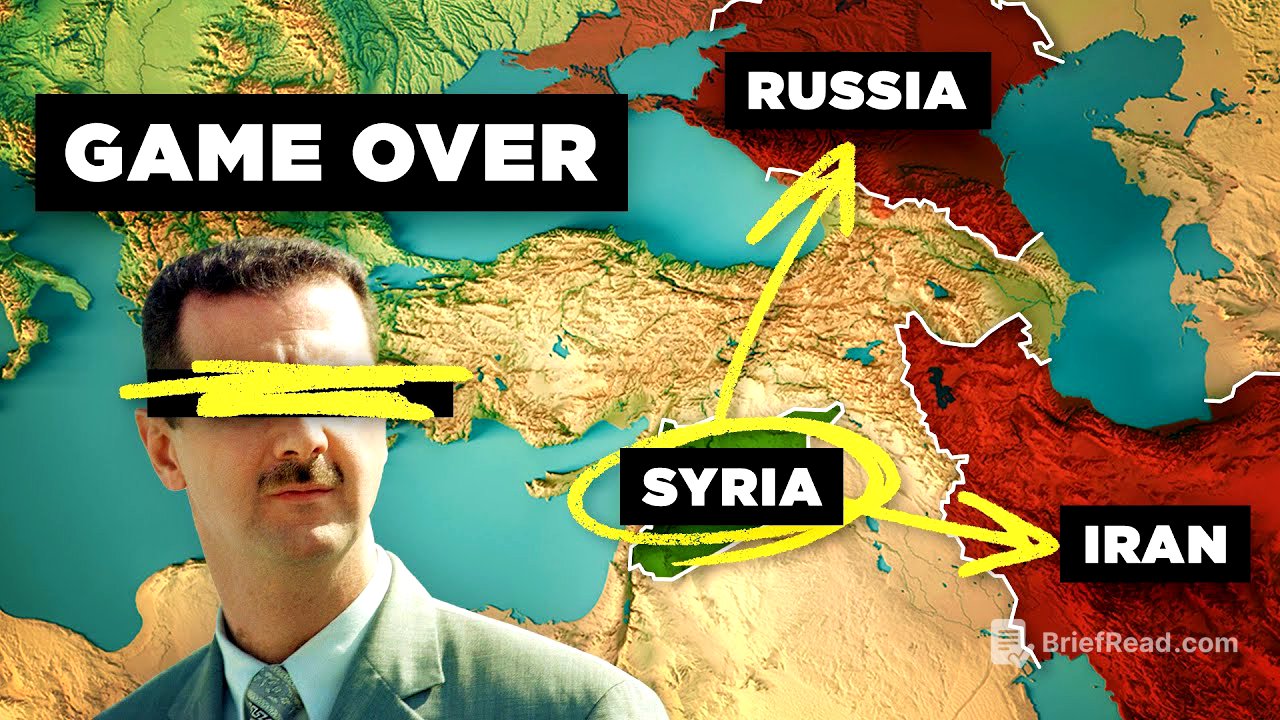TLDR;
This video discusses the recent collapse of the Assad regime in Syria and its implications for the Middle East. The author argues that the fall of Assad has dealt a major blow to both Iran and Russia, their biggest international supporters. Iran has lost its crucial land bridge to Hezbollah in Lebanon, while Russia has lost its strategically important naval and air bases in Syria. The author predicts that Turkey will benefit greatly from these developments, gaining leverage over both Syria and Libya, and potentially securing the Eastern Mediterranean for its own maritime claims.
- The collapse of the Assad regime in Syria has dealt a major blow to both Iran and Russia.
- Turkey is poised to benefit greatly from these developments, gaining leverage over both Syria and Libya.
- The fall of Assad could lead to the revival of the Qatar-Turkey gas pipeline project, further undermining Russia's energy leverage over Europe.
The Fall of Assad and its Implications for Iran [2:19]
The Assad regime's rule in Syria was a key component of Iran's strategy for confronting Israel. Syria served as a land bridge for Iran to resupply and support Hezbollah in Lebanon, Iran's most important proxy force. The collapse of the Assad regime has left Iran without this crucial land bridge, making it difficult to rebuild Hezbollah into a formidable fighting force. Additionally, Hezbollah was severely weakened by Israeli attacks in 2024, further diminishing Iran's ability to pressure Israel. The loss of Assad also means that Iran has lost its only UN member state that was truly aligned with it in the Middle East.
The Fall of Assad and its Implications for Russia [17:44]
Russia and the Assad dynasty in Syria had a long and mutually beneficial relationship. Syria granted Russia access to the port of Tartus on the Syrian coast, which became a strategically important asset for the Russian Navy. Russia, in turn, provided Syria with significant military and diplomatic support. The collapse of the Assad regime has left Russia's access to Tartus and its air base at Hmeymim uncertain. The loss of these bases would be catastrophic for Russia's current strategy, as it would lose its ability to operate freely in the Mediterranean Sea and to support its expeditionary operations across Africa.
Turkey's Gains from the Fall of Assad [28:50]
Turkey has long supported the Tripoli-based government in Libya, which has recognized Turkey's maritime claims in the Eastern Mediterranean. With the fall of Assad, Turkey is now in a position to secure both Syria and Libya for its own interests. The author predicts that Turkey will encourage its allies in Libya to launch a renewed offensive against the Russian-backed forces, potentially leading to a full Turkish victory in Libya. This would further undermine Russia's military presence in the region and free up Libya's oil reserves for unrestricted export back to Europe.
The Qatar-Turkey Gas Pipeline Project [35:36]
The collapse of the Assad regime has opened up the possibility of reviving the Qatar-Turkey gas pipeline project. This project, which would transport natural gas from Qatar to Europe via Turkey, was previously shelved due to the instability in the region and opposition from Russia. With a Turkish-backed government in Syria, the pipeline could now be routed through Syrian territory, further undermining Russia's energy leverage over Europe. The author argues that if this project is realized, Europe would no longer need to rely on Russian gas, significantly reducing Russia's influence in the region.









